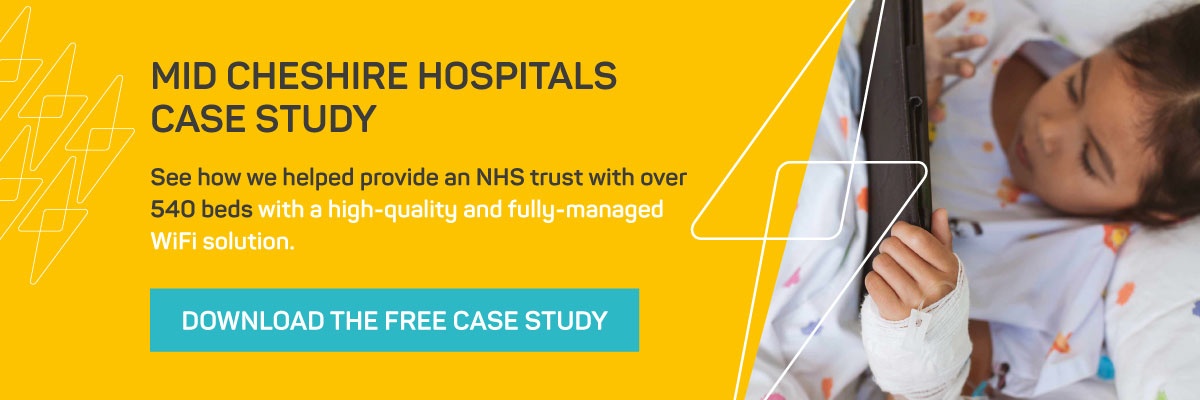Do Hospitals Really Need WiFi Access?
4 minute read | 01/04/2019

Hospitals need to provide WiFi for staff, patients and visitors. People are used to enjoying WiFi on the train, in restaurants and at sporting events so hospitals should be no different. Hospital WiFi can be used for more than just an internet connection. It can reduce costs, improve staff productivity and lead to happier visitors.
Why Hospitals Need WiFi
It Can Be Used to Boost Patient Happiness
Once a hospital has implemented WiFi, it can then look to introduce improved patient entertainment systems. They’ve been pretty basic in the past, offering limited access to television channels and forcing patients to pay for the privilege.
After the WiFi network is installed, hospitals can switch to the latest in patient entertainment. These brand new systems provide live television, on-demand shows and educational content for patients to watch and enjoy.
Entertainment like this alleviates boredom which is so frustrating for patients who may be spending long periods of time away from friends and family.
Patients that are focused on their favourite television show are less likely to be distractions for ward staff that are busy with their own tasks. It’s the same in hospices and nursing homes too. Watching television and accessing other exciting content is a morale booster for many residents and can help to keep them happy during tough periods.
Educational content is something that many people wouldn’t think of when they think of watching TV in hospital. But given the situation, it’s the perfect opportunity to provide patients with educational videos and articles that are tailored to their specific condition. For example, the cardiology ward could have content that focuses on ways of keeping your heart healthy.
Without WiFi, there would be no entertainment system and patients or residents would be left frustrated, bored and ultimately can be harder to look after for staff. It’s not about pacifying people, it’s just about making their stay a lot easier and less stressful.
Find out more about the importance of entertainment systems and other factors that can improve patient experience in our guide.
Hospital Staff are Able to do More
We touched on it a little in the last section, but hospital WiFi allows staff to work more productively and provide better care as it can streamline tasks and ensure that the right member of staff is dealing with a query.
For example, patients can use an engagement platform that utilises the WiFi to make normal requests you’d expect them to, like assistance going to the toilet or just something as simple as a glass of water. These are obviously important tasks, but they don't need to be carried out by clinical members of staff who are focused on other things. You wouldn’t expect a consultant to grab an extra pillow for a patient.
By using the WiFi, patients can make requests which are then directed to the correct member of staff. This removes ad-hoc tasks from staff members’ day, leaving them free to focus on providing treatment and care. If there's no WiFi and associated system, patients have to resort to the old-fashioned way. Either they grab someone who's passing by, even if they’re busy with another task, or, they use the ‘Call Nurse’ button which is not only outdated but can also be frustrating for everyone involved.
It Can Lead to Reduced Costs
Through the WiFi, healthcare providers can implement the entertainment platform that we’ve already talked about. The system can replace freestanding terminals and interactive wall boards which are a costly investment.
One of the key ways that costs are reduced is through a significant decrease in food waste. It’s wasted because patients order their meals in advance, only for them to be moved, discharged or be disappointed if they have not understood the full nutritional information and ordered the wrong thing.
The UK healthcare sector produces a staggering 121,000 tonnes of food waste each year. Introducing the WiFi and a better system of meal ordering can drastically cut this figure and lead to huge savings.
It isn’t just meal ordering that can be streamlined. Key things like checking into appointments and just finding your way around the hospital can have fewer issues when WiFi is introduced and used wisely.
It’s clear that WiFi is an important addition to any hospital, but it needs to be good quality WiFi that’s secure, stable and reliable. Bad WiFi is worse than no WiFi at all and will only lead to frustrated patients and problems with the day-to-day running of the hospital.
You need premium WiFi that’s going to surpass your needs and expectations.
See How WiFi Transformed Mid Cheshire Hospitals
We understand that sweeping infrastructure changes can be a difficult sell at hospitals, nursing homes and other healthcare organisations. We can list all the benefits and improvements you’d see but without evidence, there are always going to be doubts.
To ease any concerns you have and to see the positive results of WiFi in action, make sure to download our case study. Mid Cheshire Hospitals needed to find a premium, fully-managed WiFi solution that staff, patients and visitors could use and benefit from.
Download the free case study now using the link below to see how WiFi SPARK provided a bespoke and cost-effective solution.
About the author
Rebecca O'Donovan
Becky is the Marketing Director at SPARK TSL, of whom she has worked for since 2012. She is responsible for high-level marketing strategy focusing on lead generation and aiding the vision of the business to ensure business growth.
More articles by the author
Related articles
 Healthcare Industry
Healthcare Industry
Why Your Hospital Needs a Patient Engagement Platform | SPARK TSL
As we venture further into the digital era, patient engagement has become increasingly important for the ...
 Healthcare Industry
Healthcare Industry
What is NHS Improvement Doing About Patient Entertainment? | SPARK TSL
For a better overall experience,, patients need to be entertained adequately during their stay in a hospital. ...
 Healthcare Industry
Healthcare Industry
How to Improve Hospital Patient Experience: What's Happened So Far
The desire to improve patient experience in hospitals isn’t a new concept — NHS Trusts have been ...


